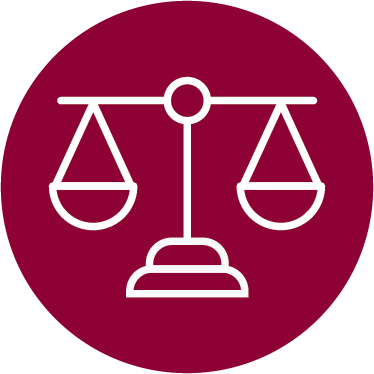
Red Folder
LOYOLA RED FOLDER
UNIVERSITY CRISIS RESPONSE & RESOURCES
The CURA Network's Red Folder is a guide to help faculty and staff recognize, respond to, refer, and report students of concern to the appropriate campus resource. Helping you to respond with care and concern is a critical factor in supporting a healthy campus community.
To download a PDF of the Red Folder, please click here.
FOR EMERGENCIES OR URGENT CONCERNS
CAMPUS SAFETY/SECURITY OR LOCAL EMERGENCY SERVICES
All other student concerns can be referred to us by submitting a report using the CSAA homepage
LAKE SHORE CAMPUS, WATER TOWER CAMPUS, AND HEALTH SCIENCES CAMPUS
773.508.SAFE (7233) 41-911 (on campus landline)
JOHN FELICE ROME CENTER
+39 06 355881
RECOGNIZE
Safety risk indicators
- Making implied or direct threats to harm self or others
- Irrational or bizarre behavior
- Academic assignments dominated by themes of extreme hopelessness, rage, worthlessness, isolation, despair, acting out, suicidal ideations/ violent behaviors
- Unprovoked anger or hostility
Psychological indicators
- Self-disclosure of personal distress that could include family problems, financial difficulties, depression, grief or thoughts of suicide
- Excessive tearfulness, panicked reactions, irritability or unusual apathy
- Unusual fearfulness, anxiety, nervousness or anger
- Expressions of concern about the student by the student’s peers
Physical indicators
- Marked/sudden changes in demeanor (appearance, personal hygiene)
- Deterioration in physical appearance/weight
- Excessive fatigue/sleep disturbance
- Intoxication, hangovers or smelling of alcohol
- Fresh cuts, scratches or other wounds
Discrimination or sexual misconduct indicators
- Self-reported sexual misconduct, including sexual harassment, assault, stalking, or dating or domestic violence
- Self-reported discrimination or harassment based on a student’s protected class(es), which include race, color, religion, sex, age, sexual orientation, gender identity or expression, national or ethnic origin, ancestry, disability, marital status, parental status, military/veteran status, and/or any other characteristic protected by applicable law
- Sudden shift in mood or strong emotional reaction when sexual violence, harassment, domestic violence, stalking, or child abuse are discussed
- Avoidance/fear/discomfort around a particular person
Academic indicators
- Essays or creative work that include disturbing content and/or themes of despair, hopelessness, suicide, violence, death, or aggression
- Repeated absences and/or a decline in quality of work or classroom performance
- Continuous classroom disruptions or overly demanding of faculty and staff time and attention
RESPOND
SAFETY FIRST
When a student displays threatening or potentially violent behavior to themselves or others, the student’s safety and the welfare of the campus community are of the highest priority. Do not hesitate to call for help.
BE PROACTIVE
Engage students early on, pay attention to signs of distress, and set limits on disruptive behavior.
BE DIRECT
Let the student know that you have noticed a change and you want to talk. Don’t be afraid to ask students directly if they are feeling confused, or having thoughts of harming themselves or others.
LISTEN EMPATHETICALLY AND CAREFULLY
Use a non-confrontational approach and a calm voice. Avoid threatening, judgmental, intimidating, or potentially embarrassing responses.
SHARE WHAT YOU KNOW
The Family Educational Rights and Privacy Act (FERPA) allows faculty and staff to report student health and safety concerns to relevant campus offices. Taking appropriate action does not violate a student’s privacy rights.
CONSULTATION AND DOCUMENTATION
Always document your interactions with distressed students and consult with your department chair/ supervisor after any incident.
REPORT

BEHAVIORAL CONCERNS: BCT
The Behavioral Concerns Team (BCT) serves as the centralized coordinated body to address student behavior that indicates distress, causes a disturbance in the community, and/or may present a danger to oneself or others. Committed to proactive, early intervention, the BCT supports students directly and through consultation with campus partners. BCT responds to every report by assessing risk and intervening, to ensure student success and safety.
When necessary, the BCT also assesses risk of harm to the University community and coordinates appropriate action to ensure the safety of individual students and the University at large through referral to the University's Threat Assessment Team (TAT).
Complete a BCT report to refer students exhibiting behaviors that present a possible threat to the safety or well-being of oneself or others (examples include suicidal ideation, self-harm, violence, or threats against others).

PERSONAL CONCERNS: CARE
CARE Case managers provide individualized support to students who seek assistance for themselves or are referred to the DOS for support in navigating personal challenges, navigating University systems, or getting connected to available resources. CARE outreach to students is conducted with privacy, sensitivity, and efficiency. After attending a CARE meeting, students can expect to be heard, affirmed, and connected to resources.
Complete a CARE report to refer students who may need general assistance overcoming serious or complex personal difficulties, or getting connected to available resources. Examples include: students struggling with general mental health concerns or food/housing insecurity, or managing a unique personal financial emergency.

DISCRIMINATION AND SEXUAL MISCONDUCT CONCERNS
The University’s response to all allegations of discrimination, sexual misconduct (including Title IX), or equity-based retaliation is coordinated by the Office for Equity & Compliance. For incidents involving students, the Office of the Dean of Students provides resources, supportive measures, and assistance navigating the University's investigation and/or other response. Most University faculty and staff employees are "responsible campus partners" with an obligation to report in specific instances (see below).
Complete an OEC referral to report alleged or suspected discrimination, sexual misconduct, or equity-based retaliation by or against any student or employee. Examples include reports of sexual assault, stalking, dating/domestic violence, and harassment/misconduct of any kind motivated by an individual's membership in a protected class.
Other contact information for the OEC (including the Title IX Coordinator) can also be found at LUC.edu/equity.
Reporting obligation for responsible campus partners
With very limited exceptions, all Loyola faculty and staff employees are referred to as "responsible campus partners" and must report any know, disclosed, alleged, or otherwise reported (formally or informally).

STUDENT CONDUCT AND CONFLICT CONCERNS
The Student Rights, Responsibilities & Conflict Resolution Team (SRCR) in the Office of the Dean of Students works to address conflict and alleged violations of Loyola’s Community Standards. SRCR promotes student success and development through upholding policies and procedures that ensure a safe, respectful, and inclusive environment in which students can thrive.
Complete an SRCR report for student conflicts or potential violations of the Community Standards.

ACADEMIC CONCERNS
Academic Concerns Referrals are appropriate when a faculty member seeks to raise a concern about academic performance, course attendance, or general academic engagement. These referrals are routed to Student Academic Services (SAS) for review and coordination with academic services and academic advising staff within SAS and across the Colleges/Schools.
Complete an Academic Concerns referral for students experiencing academic challenges or those in need of additional outreach or support.

REPORTING OBLIGATION FOR RESPONSIBLE CAMPUS PARTNERS
With very limited exceptions, all Loyola faculty and staff employees are referred to as “responsible campus partners” and must report any known, disclosed, alleged, or otherwise reported (formally or informally) incidents of sexual misconduct that satisfy any of the following criteria within 24 hours of becoming aware of the incident:
- Sexual misconduct against any individual who is currently a minor by any individual
- Sexual misconduct against an individual who is or was a student at the time of the incident
- Sexual misconduct by an individual who is or was. student or employee at the time of the incident
For more information about the obligation to report, visit LUC.edu/equity.
- Important note: To speak with a confidential advocate who has been trained to assist with issues related to gender-based violence, visit LUC.edu/wellness.
WHAT ABOUT PRIVACY?
The Family Educational Rights and Privacy Act (FERPA) permits communication about a student of concern in connection with the health and safety emergency. Observations of a student's conduct or statements made by a student are not protected by FERPA.
REFER
Office of the Dean of Students (ODOS)
773.508.8840 • LUC.edu/dos
Provides advocacy and support for students experiencing challenging or complex life circumstances
- Student Rights, Responsibilities, and Conflict Resolution Team (SRCR)
773.508.8890
Resolves Potential violations of LUC's Community Standards and provides formal and informal conflict resolution services.
Office for Equity & Compliance (OEC)
773.508.7766 • LUC.edu/equity
Coordinates University’s response to reports and complaints of discrimination, sexual misconduct, and equity-related retaliation
Student Accessibility Center (SAC)
773.508.3700 • LUC.edu/sac
Provides support and accommodations for students with disabilities
First and Second Year Advising (FSYA)
773.508.7714 • LUC.edu/fsya
Serves the academic advising and support needs of students through their first and second years
Residence Life
773.508.3300 • LUC.edu/reslife
Provides support for students living in the residence halls
Campus Ministry
773.508.2200 (LSC); 312.915.7186 (WTC); 708.216.1364 (HSC)
LUC.edu/campusministry
Provides spiritual guidance, including support for grief and loss
Center for Student Engagement
body content here
Center for Black Student Excellence
312.915.6642 • LUC.edu/cbse
Serves as a central hub for supporting Black students in our Loyola community.
CRISIS HOTLINES
800.273.TALK (8255)
National Suicide Prevention Hotline
suicidepreventionlifeline.org
24/7, free and confidential support for people in distress. Phone, text message, and online chat support options for suicide prevention and resources
LEARN MOREstevefund.org
The Steve Fund
Text STEVE to 741741 to begin chatting 24/7, free and confidential text line for people in crisis; dedicated to the mental health and well-being of students of color
LEARN MORE888.488.7386
The Trevor Project
thetrevorproject.org
24/7, free and confidential hotline for LGBTQ youth. Telephone, text message, and online chat support options for prevention and crisis resources for LGBTQ youth
LEARN MORE